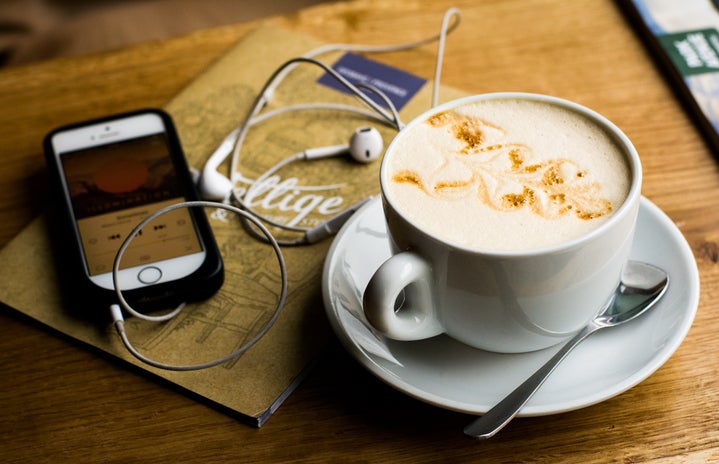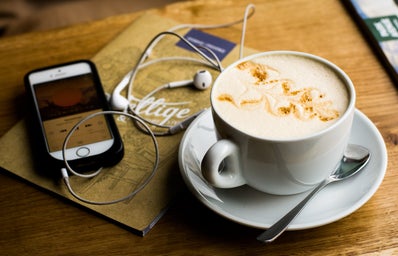Every morning, for the past four years, I’d sprint to my kitchen and brew a cup (or three) of pour-over coffee. The ritual of grinding the beans and smelling the aromas became a form of mediation for me. I dedicated myself to learning the craft of coffee. I invested in premier equipment and high-quality beans. It became a part of my personality. I could write a book about coffee. Coffee became a part of my life. I couldn’t live without it.
You could say I was addicted.
This all changed recently, though, when I realized the intense effects the multiple cups had on my body, mainly because I had to keep increasing the amounts I was drinking to reap the positive benefits. Symptoms of caffeine overload include (but are not limited to) anxiety, upset stomach, acid reflux, racing heart, dehydration, sweating, restlessness, heart palpitations, insomnia, and others that I’d prefer not to go into detail about (LOL).
However, these were all side effects I was willing to endure for the jolt of energy, elation, comfort, and focus caffeine gave me. This is because caffeine is a literal drug, a psychoactive stimulant. Caffeine excites our brain cells, which tells our hormone control center, the pituitary gland, that there’s an emergency. The pituitary tells the adrenal glands (located above the kidneys) to flood the body with adrenaline. This is the “flight or fight” response. For those with underlying anxiety and busy brains, this reaction can exacerbate and worsen underlying symptoms.
To reduce my anxiety and coffee’s unpleasant side effects, I decided on a whim to quit and replace it with Matcha. On a mission, I went to my favorite local coffee shop, Southdown Coffee, to taste test a matcha latte. I ordered their standard matcha latte with almond milk (of course), and it was love at first sip.
Although matcha tea has caffeine, there is much less. Coffee has roughly 95-130 mg of caffeine versus Matcha’s 19-30 mg. The effects of caffeine in Matcha on our body differ significantly from the effects of caffeine from coffee. When the caffeine in Matcha binds with its amino acid L-theanine, the caffeine releases at a slower rate. This contrasts with coffee’s rapid consequences. Even more, Matcha has a rich supply of antioxidants, helping fend off disease and fight inflammation. Specifically, it contains catechins, an antioxidant with various antioxidative and anti-inflammatory properties discovered in epidemiological studies. Coffee also has antioxidants, but not nearly as much as matcha tea.
Be careful, though! Only purchase organic and single-origin Matcha from Japan. This ensures that your cup doesn’t contain pesticides and contaminants. Matcha is made from the whole leaf, so there is more surface area for pesticides. Japan has the strictest protocols for pesticides, so purchase products certified organic by JAS to ensure you aren’t doing more harm than good.
I created a new ritual with some fancy matcha supplies and learned from the pros how to make the best latte.
Here’s what you need:
-
1 tsp organic ceremonial grade matcha green tea powder (adjust to taste)
-
2-3 oz hot water, heated to 175 degrees
-
1 cup milk (I use almond breeze vanilla unsweetened almond milk- the superior almond milk)
-
Honey to taste (I love manuka, because of the health benefits)
-
Matcha Whisk
-
Matcha bowl (or you can do it in your mug!)
Here’s what you do:
-
Measure out matcha powder in a bowl
-
Add water at 175 degrees and whisk for 30 seconds in a “Z” shape, until frothed
-
Add in milk (I froth mine)
-
Spoon in the honey
I’m officially three weeks without coffee, and the withdrawals are real. After all, caffeine is a drug. My body has had to adjust to the drastic decrease, resulting in massive headaches, fatigue, and body aches. I thought I had COVID at one point! They have started to fade, though, and I’m slowly adjusting. When I get a headache, I supplement with some chocolate (and I’m not complaining)! Interestingly, I don’t miss the taste of coffee as much as I thought I would. Even better, my body loves Matcha’s smooth and steady release of caffeine compared to the coffee zaps.
Here is what I noticed, overall:
-
My anxiety improved immensely
-
I am falling asleep easily
-
Improved digestion
-
Clearer skin
So, if you find yourself in a similar situation with coffee, anxiety, and caffeine, Matcha may be just for you. Not only does it taste amazing, but it has incredible health benefits for the mind and body.



